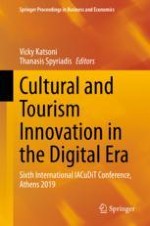2020 | OriginalPaper | Buchkapitel
Greece as a Dreamy Destination Through the Creation of e-Branded Content: The Case of the Greek National Tourism Organization
verfasst von : Elli Vazou
Erschienen in: Cultural and Tourism Innovation in the Digital Era
Aktivieren Sie unsere intelligente Suche, um passende Fachinhalte oder Patente zu finden.
Wählen Sie Textabschnitte aus um mit Künstlicher Intelligenz passenden Patente zu finden. powered by
Markieren Sie Textabschnitte, um KI-gestützt weitere passende Inhalte zu finden. powered by
